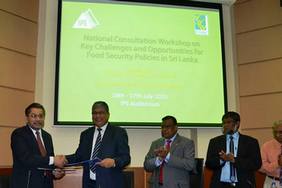
Delegates at the workshop in Srilanka
Over the years economic growth in South Asia has significantly helped in achieving production targets and reducing poverty, but still a lot needs to be achieved. Dominated by small holder farmers, with limited access to markets, high transaction costs, post-harvest losses, and shifting climate change, farmer’s need informative support and policy environment across the four parameters – production, availability, access and affordability to achieve food and nutritional security.
Check out the presentation by Dr. P.K. Joshi on Food and Nutrition Security in South Asia at "National Consultation Workshop on Challenges and Opportunities for Food Security Policies in Sri Lanka" which was jointly organized by Institute of Policy Studies of Sri Lanka (IPS) and International Food Policy Research Institute (IFPRI) from July 16-17, 2015 at Colombo, Sri Lanka.
The main objective of the two-day workshop was to identify the key challenges and opportunities for food security in Sri Lanka and provide the basis for the formation of a successful food security policy framework for the country.
IFPRI and IPS also signed a Memorandum of Understanding (MOU) for a collaborative research on Food Security in South Asia to strengthen research and capacity building. The MoU also aims to facilitate effective management of agricultural resources, by government and poor rural communities in developing countries, and increase the impact of research.
Media Articles
IPS and IFPRI partner to strengthen collaboration in South Asia on food security policies
South Asian countries must learn from Southeast Asian food security provision


